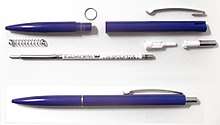pen
English
Pronunciation
- IPA(key): /pɛn/
- (pin–pen merger) IPA(key): /pɪn/
Audio (US) (file) Audio (US-Inland North) (file) - Rhymes: -ɛn
- Homophone: pin (pin-pen merger)
Etymology 1
From Middle English pen, penne (“enclosure for animals”), from Old English penn (“enclosure, fold, pen”) (in compounds), from Proto-Germanic *pennō, *pannijō (“pin, bolt, nail, tack”), from Proto-Indo-European *bend- (“pointed peg, nail, edge”). Akin to Old English pennian (“to close, lock, bolt”) (in compounds onpennian (“to open”)), Low German pennen (“to secure a door with a bolt”), Old English pinn (“peg, bolt”). More at pin.
Sense “prison” originally figurative extension to “enclosure for persons” (1845), later influenced by penitentiary (“prison”), being analyzed as an abbreviation (1884).[1]
Noun
pen (plural pens)
Translations
|
|
Verb
pen (third-person singular simple present pens, present participle penning, simple past and past participle penned or pent)
- (transitive) To enclose in a pen.
- (Can we date this quote?) John Milton
- Watching where shepherds pen their flocks at eve.
- (Can we date this quote?) John Milton
Translations
|
|
Etymology 2

From Middle English penne, from Anglo-Norman penne, from Old French penne, from Latin penna (“feather”), from Proto-Indo-European *péth₂r̥ ~ pth₂én- (“feather, wing”), from *peth₂- (“to rush, fly”) (from which petition). Proto-Indo-European base also root of *petra-, from which πτερόν (pterón, “wing”) (whence pterodactyl), Sanskrit पत्रम् (patram, “wing, feather”), Old Church Slavonic перо (pero, “pen”), Old Norse fjǫðr, Old English feðer (Modern English feather);[1] note the /p/ → /f/ Germanic sound change.
Noun
pen (plural pens)
- A tool, originally made from a feather but now usually a small tubular instrument, containing ink used to write or make marks.
- He took notes with a pen.
- (figuratively) A writer, or his style.
- He has a sharp pen.
- (Can we date this quote?) Fuller
- those learned pens
- (colloquial) Marks of ink left by a pen.
- He's unhappy because he got pen on his new shirt.
- A light pen.
- (zoology) The internal cartilage skeleton of a squid, shaped like a pen.
- 2017, Danna Staaf, Squid Empire, ForeEdge, →ISBN, page 117:
- A pen is nothing more complex than a decalcified shell, so one mutation of the genes that controlled calcification could be all it took.
-
- (now rare, poetic, dialectal) A feather, especially one of the flight feathers of a bird, angel etc.
- 1590, Edmund Spenser, The Faerie Queene, I.xi:
- And eke the pennes, that did his pineons bynd, / Were like mayne-yards, with flying canuas lynd, / With which whenas him list the ayre to beat […]
- 1590, Edmund Spenser, The Faerie Queene, I.xi:
- (poetic) A wing.
- (Can we find and add a quotation of Milton to this entry?)
Derived terms
- ball pen
- ball-point pen
- border pen
- bull pen
- cartridge pen
- dip one's pen in someone's inkwell
- felt-tip pen
- fountain pen
- goose pen
- lettering pen
- pen cancellation
- pen feather
- penmanship
- pen-mate
- pen name
- pen pal
- pen-pusher
- poison pen
- you don't dip your pen in company ink
Translations
|
|
|
|
Verb
pen (third-person singular simple present pens, present participle penning, simple past and past participle penned)
- (transitive) To write (an article, a book, etc.).
Translations
Etymology 3
Origin uncertain. Compare hen.
Translations
Etymology 4
Shortened form of penalty
References
- “pen” in Douglas Harper, Online Etymology Dictionary, 2001–2019.
Dutch
Etymology
From Middle Dutch penne. This etymology is incomplete. You can help Wiktionary by elaborating on the origins of this term.
Pronunciation
- IPA(key): /pɛn/
Audio (file) - Rhymes: -ɛn
Derived terms
- (pen): balpen, kroontjespen, vulpen
- (pin): aardingspen, scharnierpen, zadelpen
Mandarin
Romanization
pen
Usage notes
- English transcriptions of Mandarin speech often fail to distinguish between the critical tonal differences employed in the Mandarin language, using words such as this one without the appropriate indication of tone.
Middle English
Etymology 1
From Anglo-Norman penne.
Etymology 2
From Old English penn, from Proto-Germanic *pennō.
Pronunciation
- IPA(key): /pɛn/
- Rhymes: -ɛn
Related terms
References
- “pen (n.)” in MED Online, Ann Arbor, Mich.: University of Michigan, 2007, retrieved 2018-04-24.
Mindiri
Further reading
- Malcolm Ross, Proto Oceanic and the Austronesian Languages of Western Melanesia, Pacific Linguistics, series C-98 (1988)
Norwegian Bokmål
Etymology
Possibly from French
Norwegian Nynorsk
Etymology
Possibly from French
Tok Pisin
Noun
pen
- pain
- 1989, Buk Baibel long Tok Pisin, Port Moresby: Bible Society of Papua New Guinea, 3:16:
- (please add an English translation of this quote)
-
Volapük
Welsh
Etymology
From Middle Welsh penn, from Proto-Brythonic *penn, from Proto-Celtic *kʷennom.
Pronunciation
- IPA(key): /pɛn/
Related terms
- penglog (“skull, cranium”)
Adjective
pen (equative penned, comparative pennach, superlative pennaf)
Mutation
| Welsh mutation | |||
|---|---|---|---|
| radical | soft | nasal | aspirate |
| pen | ben | mhen | phen |
| Note: Some of these forms may be hypothetical. Not every possible mutated form of every word actually occurs. | |||
References
- Angharad Fychan and Ann Parry Owen, editors (2014), “pen”, in Geiriadur Prifysgol Cymru Online (in Welsh), University of Wales Centre for Advanced Welsh & Celtic Studies